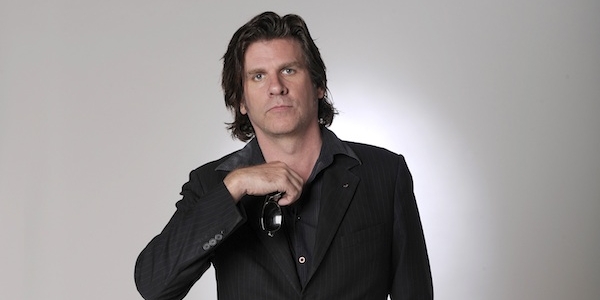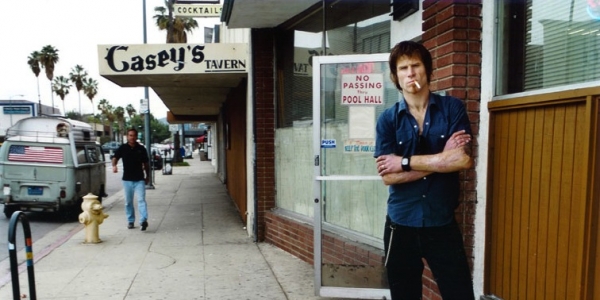Fast forward to present day times. I’m halfway through my 30-minute chat with the one and only Tex Perkins regarding his starring role in The Man In Black, a ‘music-driven documentary-style story’ about Cash’s rise to stardom. Perkins is recreating that famous flip-off, his middle finger hovering only five centimetres away from my face. I’m thinking, ‘Holy shit, this guy was born to play Johnny Cash.’
And just as well. For 18 months, Perkins has allowed his “inner Johnny” to run amok on the stage in Australia, accompanied by The Tennessee Four. Now in 2012, The Man In Black is back, gearing up for another run.
Perkins and Cash go way back. Perkins’ first band, The Dum Dums, played Cash tunes, and the offer to play the legend in a theatrical production was simply too good to pass up. “It was a – I don’t like this term – but it was a ‘no-brainer,’” Perkins admits. “It was a walk-up gig, it was too easy! I should have said ‘no’ because it was too easy,” he laughs. Perkins laughs a lot, in his deep and easy-going baritone, and it’s infectious.
“But [the offer] came up at exactly the right time, as I’d just come to the end of a very long contract,” he continues. “Even though it wasn’t all tears and threats with the record company, I wanted to end it and move on. But there was a clause that said that 12 months after the contract ends, anything I recorded or released [the record company] would still be able to sink their hooks into it!
“THEN THERE APPEARS IN MY LIFE THIS MAN,” Perkins bellows. “[Producer Simon Myers] said, ‘Do you want to do a show about Johnny Cash?’ And I agreed, instantly. Without considering it. It was a very risky thing, but I actually did not use my brain! There could have been plenty to consider, but it just seemed like, ‘me, Johnny Cash, yes’.”
But what is it exactly about Johnny Cash that transcends genres? I mean, rockers love him, as do indie-pop people, punks and just about everybody else. Perkins has a couple of theories.
“First off, he had his eye on his own mythology,” Perkins says. “Not that he was a bullshit artist, but you know, he associated himself with prisons, and singing songs of those types, and maybe there are a lot of people out there who have ideas about him that aren’t true! A lot of people assume that he did hard time; you just think those things, because of a sort of mythology. Not that there’s not a great story there, of course there’s a great story.
“Bottom line is he wrote a lot of great songs,” he continues. “They’re all very simple and … all-encompassing. I mean me, as a 16-year-old, my first band was playing Johnny Cash; [the songs] were simple and accessible and achievable for a 16-year-old.” At this, Perkins pantomimes playing guitar of Walk The Line. “And it’s like, ‘Wow, that sounds really cool!’ You know, you didn’t have to play well. Just make contact with the strings and you’re halfway there!” he continues.
Given Perkins’ experience and knowledge of all things Cash, I wonder aloud if the script had already been completely written when he made his ‘no-brainer’ decision to take the lead. Or did Perkins help write any of it? Perkins leans forward intently and presses his hands together. “Well, there was a script,” he begins, arching his eyebrows. “And during the course of most of the initial rehearsals, we did some rewriting; going back to the main writer (Jim McPherson) and saying, ‘Uh, we changed this, is that okay?’ ‘Yeah!’ And then occasionally he’d go, ‘No, NO, you can’t change that!’
“So, yes, we all threw in ideas and changes in the initial stages. But then as the show goes on – we’ve done over 150 of the fuckers – we sort of change it naturally. We’d go, ‘Oh, this doesn’t work anymore,’ or maybe I’ll say something spontaneously and it’s ‘Whoa, that’s hilarious!’ And then it goes in the script and then after three weeks it’s ‘Oh, this is getting really tired.’
“[The Man In Black] is a living thing, and to Simon’s credit, he’s allowed that to happen to the benefit of the show, and it keeps it alive.”
As our talk winds down to a close, I ask Perkins about his own mythology. How does he feel he’s managed it?
“TERRIBLE,” he laughs. “The Ladyboys for instance. A lot of people will never forgive me for the Ladyboys. There’s a group of people in rock‘n’roll that think serious artists don’t do things like that. It’s an unwritten rule some people have: Thou shalt not do self-parody. Anyway, I’ve broken all those rules before, whatever they are. There’s not a consistent narrative with my career. From release to release, I’m working with different people each year: I’ll do a Don & Charlie album, I’ll do a Beasts of Bourbon album, I’ll work with Tim Rogers and an orchestra, then I’ll do the Ladyboys, back to Dark Horses, then I’m doing the Johnny Cash thing … so I think that’s just the way that I am, and it’s the way that I’ve been, and the way I always will be. It would be hard to lodge a narrative by the way my career goes!”
So it’s difficult to pin Tex down?
“That’s the idea!” he bellows, laughing.
BY THOMAS BAILEY

